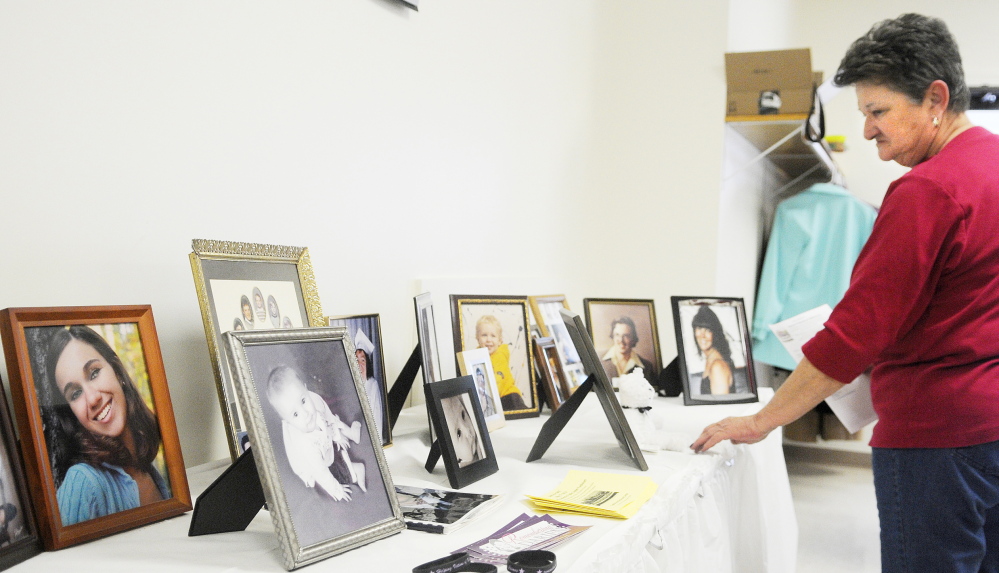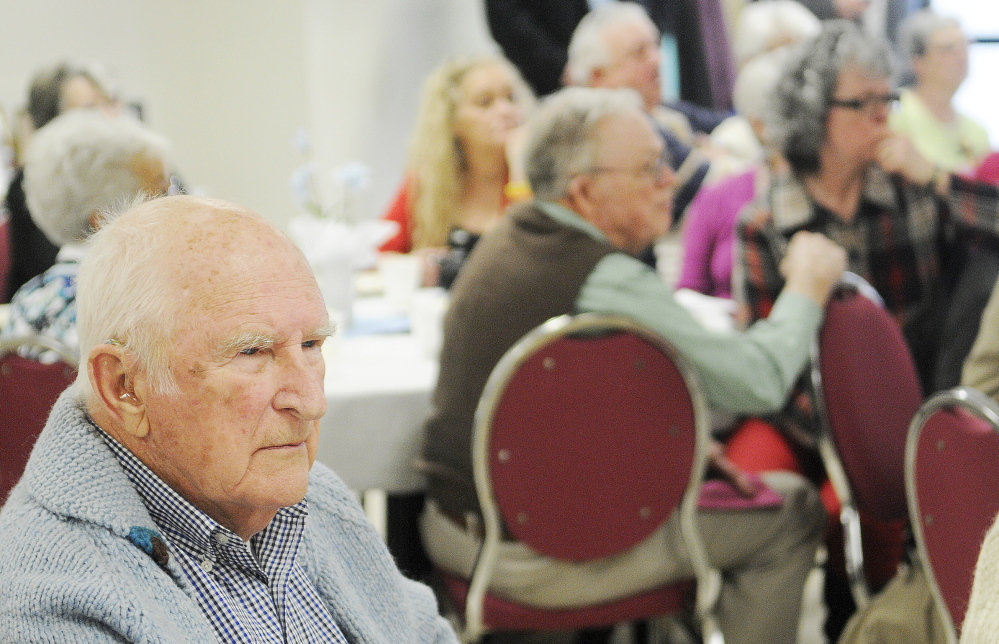AUGUSTA — Brooke Locke always took pride in her looks, so the pretty 21-year-old always was particularly indignant when her uncle teased her, threatening to post online childhood photos of Locke sporting a gaping hole left by her two missing front teeth.
“I used to get the biggest rise out of her all the time,” said the uncle, Dan Locke of Farmingdale, his voice thick with grief. “To me the most precious pictures of her were where she was a little girl and she was missing her teeth.”
Brooke Locke was murdered inside her Bangor apartment last November. Her relatives for the first time on Sunday joined dozens of other family and friends of homicide victims for the annual Maine Crime Victims Rights Week Luncheon at Le Club Calumet. The luncheon is sponsored by the Maine Chapter of Parents of Murdered Children, the state’s only support group for those who have lost loved ones to homicide, said Mary Farrar, a former victims’ advocate with the Office of the Maine Attorney General. Farrar’s brother, William Nicola, was murdered in 1974 during a holdup at the family business.
“When you’re in a group of survivors, you don’t have to say anything,” Farrar said. “It might be a hug, a handshake, whatever. You get it. We’ve all walked in each other’s shoes.”
Guest speakers, including Gov. Paul LePage, Deputy Attorney General and Augusta Mayor William Stokes and Maine State Police Detectives, assured their commitment to solving the state’s 100 cold homicide cases and explained the process of investigating such cases. Assistant Attorney General Laura Nomani, whose work focuses on investigating cold cases, said that in the past 15 years the state has successfully prosecuted 13 cases dating back to the 1970s, ’80s and ’90s. The cases are, by definition, the most difficult to solve, Nomani said.
“We are doing very good work, and we will continue to do very good work,” Nomani said. “We are personally and professionally committed to solving these cases.”
Cold homicide cases are currently assigned to Maine State Police Major Crime Unit detectives who must wedge ongoing investigations in between fresh cases of serious felonies, such as homicide and sexual assault. Stokes said a bill before the legislature, LD 1734, would create a cold case unit in the state police. The bill has cleared committee with a recommendation to pass, but so far there is no funding.
“I can’t promise you if we get this unit we’ll clear all the cases, but I think we’ll at least give these cases as thorough a review as they deserve,” Stokes said.
Arthur Jette, who heads up the Maine Chapter of Parents of Murdered Children, urged those at the luncheon to call on their legislators to fund the unit.
“I believe there’s no higher purpose for our government than to provide justice for our citizens,” said Jette, whose grandson was murdered in 1999. “We all have that in common. We’re seeking justice while we try to reconstruct a sense of normal in our lives. Justice requires we never stop trying to find the truth.”
Sgt. Jason Richards, a detective with the Maine State Police Major Crime Unit’s northern division, which serves the 11 northern counties, including Kennebec and Somerset counties, said cultural changes in social media and in drug use have changed the face of homicide investigations over the past decade.
“The complexity of people’s lives have changed how we do things,” he said. “We live in a world where unfriending someone can be a cause for murder.”
Despite those challenges detectives have in recent years achieved a homicide clearance rate of more than 100 percent.
“We’re clearing the cases that are coming in,” Richards said. “We are solving cases from years past.”
Richards said that success offers little solace to families still awaiting prosecution of those who murdered their loved one.
“For those of you who haven’t found justice, whose cases we haven’t been able to solve, I know that’s short of the mark,” Richards said. “I understand that.”
Stokes gave an overview of the criminal division within the Attorney General’s office, explaining how cases move through the system and how that process has changed over the years. One thing that hasn’t changed, Stokes said, is the commitment from all involved to find killers and put them in prison.
“One of the things I think we owe all of you is our best effort,” he said. “There are times I think of you, and I’m sure you think you have been abandoned. I never stop thinking about your cases. I know they are your loved ones.”
LePage said the state must focus on solving open murder cases, including cold cases, while simultaneously striving to reduce the number of homicides by curbing domestic violence.
“That’s my little part, trying to prevent future crimes,” he said.
LePage, who has been open about his own history as a victim, said domestic violence touches all parts of society.
“There’s no monopoly on domestic violence,” he said. “I don’t care what your background is, it’s tough.”
The number of domestic violence incidents continues unabated, LePage said, but efforts to stop the trend have made headway in making such incidents more intolerable both to society and the victims.
“They’re not putting up with it any more,” LePage said. “The only way we’ll get rid of it is to make it socially unacceptable.”
LePage, who is running for re-election in November, said his campaign to end domestic violence will continue whether or not voters return him to the Blaine House.
“I find it one of the most heinous crimes, to lift a finger against another human being,” LePage said. “The last thing a parent ever wants to do is bury a child. I can’t imagine the pain you’ve been through.”
As much as Brooke Locke’s family wants justice, ultimately nothing will bring her back, Dan Locke said. He said his comfort comes in the knowledge that one day her killer will stand before the judgment throne of God.
“We’ll get through this as a family,” Locke said. “We’re always going to be touched by this. It’s a path we would rather not have had to take, but we didn’t have any choice in the matter.”
Locke smiled as he rattled off adjectives such as kind, loving and funny to describe his niece. Locke’s 11-year-old son, Collis C. Locke, excitedly interrupted with his own words to describe his cousin. He ultimately settled on one: awesome.
Just before she died, Brooke Locke brought her cousin a game.
“She taught me how to play it,” Collis Locke said. He never saw her again. A few days later Brooke Locke’s family went to the apartment where she had reportedly been bound and assaulted over several hours. Her ex-boyfriend, 21-year-old Zackery Mailloux, has been charged with her murder.
“She had no idea this person was capable of doing what he did to her,” Locke said.
Brooke Locke, according to her obituary, served on the yearbook committee at Edward Little High School in Auburn and was studying to become an occupational therapist at Husson University. She settled on the career path after working with the elderly at a nursing home. She would have loved the life she was making, her family says. Dan Locke said his family is still coming to grips with the reality that his niece will never get a chance to live out those dreams.
“There’s an element of this that is not even real,” Locke said. “She was here and then she’s gone. You don’t know when you’re going to lose someone.”
Craig Crosby — 621-5642
ccrosby@centralmaine.com Twitter: @CraigCrosby4
Send questions/comments to the editors.




Success. Please wait for the page to reload. If the page does not reload within 5 seconds, please refresh the page.
Enter your email and password to access comments.
Hi, to comment on stories you must . This profile is in addition to your subscription and website login.
Already have a commenting profile? .
Invalid username/password.
Please check your email to confirm and complete your registration.
Only subscribers are eligible to post comments. Please subscribe or login first for digital access. Here’s why.
Use the form below to reset your password. When you've submitted your account email, we will send an email with a reset code.